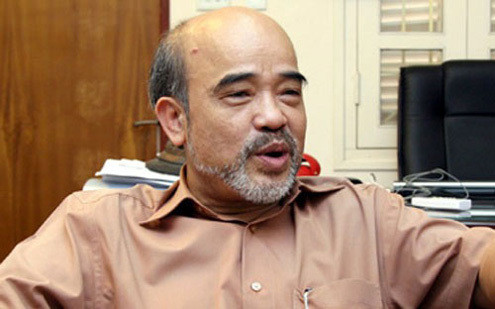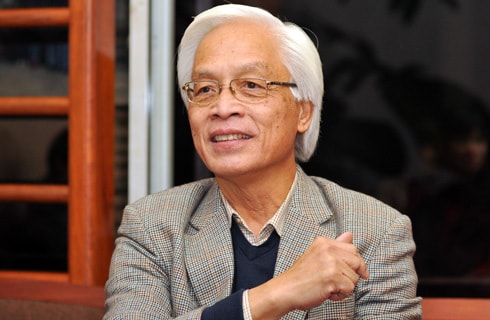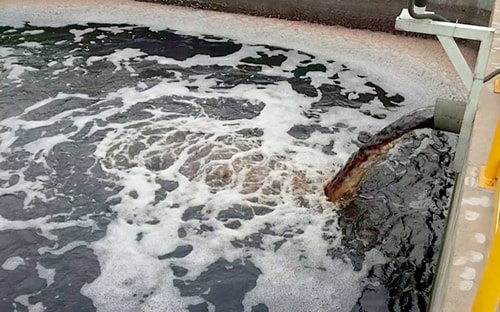Experts speak out about the results of the announcement of the culprit causing fish deaths
Formosa's admission of fault and compensation was assessed by Professor Dang Hung Vo as a great victory for the Government, while Professor Chu Hao expressed many concerns.
Acknowledging that the Government has tried very hard with valid scientific arguments to find the cause and culprit of the recent fish deaths in four central provinces, Professor Dang Hung Vo said he was not too surprised.
Formosa's admission of its actions, according to Professor Vo, is a great victory for Vietnam, because the authorities have found the nature of the problem, creating trust among the people. "Giving a firm and objective conclusion will help the people not to lose direction and regain their trust in the face of suspicions that the Government is withholding information," Mr. Vo commented.
 |
Mr. Dang Hung Vo. Photo: Vneconomy. |
Mr. Vo also highly appreciated the handling ability of Minister of Natural Resources and Environment Tran Hong Ha. From being bewildered by such a large environmental incident, which happened for the first time in Vietnam, the Minister remained calm and came up with the right solutions.
Mr. Vo agreed that Vietnam took two important pillars: scientific basis and legality, along with the initiative to bring in international scientists. "Vietnam has made the most of the capacity of many great scientists in the world, helping to "accuse" Formosa," Mr. Vo said.
 |
Professor Chu Hao is not satisfied with the Government's press conference announcing the cause of fish deaths. Photo: Nhat Minh. |
Regarding the $500 million that Formosa pledged to pay in compensation, Professor Chu Hao said that it is not possible to say whether this amount is small or large because further assessment is needed. However, according to him, the impact of the incident not only destroys the livelihood of the people in the Central region who work in fishing and tourism, but more importantly, it causes a crisis of communication and trust.
When he learned that Formosa was the culprit in the fish deaths, Mr. Chu Hoi, former Deputy Director General of the General Department of Seas and Islands, was "both happy and worried". He was happy because what he and the people were waiting for was here and was based on solid scientific evidence. But he was worried about whether Formosa would fulfill its commitment or not, and how Vietnam would monitor it in the coming time.
Vietnam's response to Formosa
Acknowledging that Formosa has serious shortcomings, Professor Dang Hung Vo believes that we should not take an extreme approach. Formosa has a policy of investing in construction and has no intention of withdrawing, so he believes that this unit will avoid similar incidents. More importantly, Vietnam needs to have a strict system of environmental management, monitoring, and investment.
Citing the saying "Hit the one who runs away, not the one who runs back", Mr. Chu Hoi expressed that Formosa needs to change its perception and take practical actions to quickly and seriously resolve the unfortunate consequences.
According to Mr. Hoi, Formosa must bring the discharge pipes above ground and not bury them underground to discharge directly into the sea. At the same time, Vietnam needs to build the most favorable mechanism for environmental management and monitoring in the operation of the Formosa project. The company also needs to prepare a plan for real production, not just a trial. "Vietnamese people will not trade fish for steel," Mr. Hoi affirmed.
Among the many things that need to be done, according to Professor Chu Hao, Vietnam needs to focus on clarifying the immediate and long-term damage and specific remedies. "How many years will the marine environment be in danger? When will it be restored? What is the solution? It's not just about the government's support or Formosa's compensation," said Mr. Hao.
He also suggested that the Government review the process of project appraisal and approval and the operation of Formosa Ha Tinh, from which to consider responsibility and propose appropriate forms of handling, including considering criminal prosecution. Vietnamese authorities need to review legal documents on investment and environment appropriately.
In addition to proactively monitoring industrial waste discharge, Mr. To Van Truong, former director of the Vietnam Institute of Water Resources Planning, noted that it is also necessary to monitor solid waste and air that Formosa discharges into the environment.
The $500 million in compensation needs to be made public, transparent, and reach those who have suffered. In the long term, Formosa must continue to consider contributing to the restoration of the marine ecosystem, especially coral reefs, the common home of marine life.
 |
Wastewater discharged from Formosa Ha Tinh. Photo: Duc Hung. |
Lessons from the disaster
According to Professor Nguyen Minh Thuyet, former Vice Chairman of the Committee for Culture, Education, Youth and Children, the recent incident shows the gap in responding to environmental disasters in particular and natural disasters in general. Specifically, the fish deaths occurred in early April, but the authorities were slow to respond and when they did, they gave vague information, causing suspicion among the people.
"Countries around the world often have committees or ministries in charge of serious and urgent incidents caused by humans. Vietnam should learn from their experiences or come up with actions to take when serious incidents occur," Mr. Thuyet suggested.
The next lesson, Professor Thuyet pointed out, is that economic development must be associated with a sustainable environment. We should not pursue economic goals but introduce outdated technology that pollutes the environment.
Sharing the same view, Professor Chu Hao said: "Vietnam should accept investment not only based on economic efficiency but more importantly, on environmental impact assessment, especially the monitoring and inspection stage. We must monitor whether the waste discharged from the factory meets the standards or not, instead of continuing to fine for survival."
In addition, experts say that legal documents related to the environment need to be reviewed, especially standards on industrial waste discharge, environmental assessment and monitoring..
According to VNE

